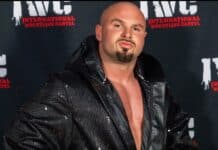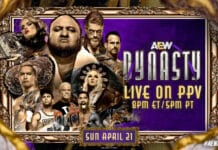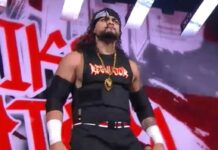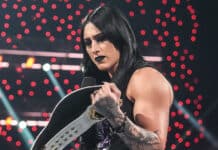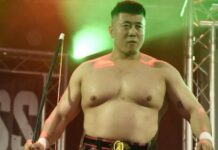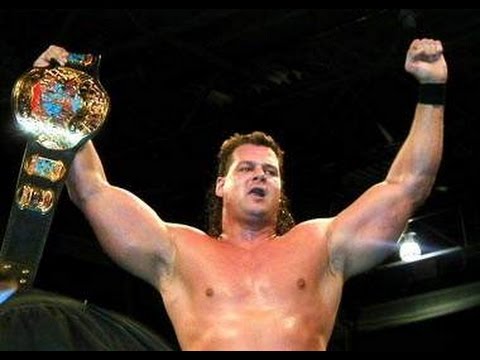
Today marks twenty years since the ECW Guilty As Charged pay-per-view that was held in Birmingham, Alabama with nearly 5,000 fans in attendance. The event itself represents a unique period for the South Philadelphia-based organization, as the pressure of the competition of the industry began to squeeze the company, but at least for a short time, the promotion still had some of its trademark star power for this show. However, the glaring exception on the card was one of the group’s most well-known stars, Tazz, who would debut for the WWF at the Royal Rumble at Madison Square Garden just two weeks later. Tazz was one of the cornerstones of the company and he represented much of the image of the group, similar to names like Sabu, Rob Van Dam, and Tommy Dreamer. Make no mistake about it, the departure of Tazz, who put over RVD at the previous pay-per-view, November to Remember 1999, was a major dip in the momentum and the star power of the organization.
The under card was decent, but nothing too spectacular. The opening match was CW Anderson vs. Mikey Whipwreck, who returned from a six month stint in WCW, where he only made roughly a dozen appearances for a contract that was probably offered to him more to take a performer away from ECW than anything they might’ve had planned for him in the disarray of WCW in 1999. It appears that his departure to WCW didn’t put him in good favor with the ECW office because his return to the extreme group wasn’t touted or featured and even after a memorable tag team run with Tajiri in 2000, Mikey never reached the level he had prior to the WCW run. The Danny Doring, Roadkill, and Simon Diamond vs. Nova, Kid Kash, and Jazz match was basic and was more or less just a way to get more wrestlers on the card. The Yoshihiro Tajiri and Super Crazy vs. Little Guido and Jerry Lynn tag team match was solid, but the downside was that this group of stars had been booked for matches against each other in various matches several times before so it was mostly a repetitive match. The more important aspect of this is, it’s interesting to consider that this mid-card could’ve eventually been used to keep the company stable if it had continued more than just another year. Speaking of which, it’s somewhat disappointing that CW Anderson didn’t truly get a chance to make a name for himself because he only had about a year and a half working for a national company before the entire industry consolidated and there were a limited amount of spots on the national platform. Tajiri is another athlete that probably didn’t get the credit he deserved for the peak of his career, and ECW seemed to suit his persona very well. Again, when the WWF was flooded with talent from the WCW buy out, the fact that Tajiri landed a job was more than most of the remaining ECW roster in 2001. That being said, as far as replenishing the main event scene, Tajiri had the in-ring ability and a unique aura that could’ve been used for a solid title run. An example of someone that did get a chance to make a leap further up the card prior to the shutdown was Steve Corino, who undoubtedly could’ve had an extended run as ECW heavyweight champion if the company didn’t fold the following year.
The Angel/New Jack match was the typical brawl that you would think it would be, but there’s some substance to this particular storyline. Despite his reputation after a series of unwise decisions throughout his career, New Jack was charismatic and had an authenticity that could’ve been used to draw money, even outside of the wild structure of ECW. New Jack was believable and his persona appeared to be legitimate, especially during the prime of his career. Obviously, his signature spot was tailored for ECW so he didn’t necessarily wrestle official matches regularly, but he still had credibility for his character. So, when he was actually defeated during the course of this feud, it stood out and put Angel over as more than just another wrestler on the card to replace others that might’ve exited the company.
The RVD/Sabu match was really solid and provided some substance to the card. However, even this contest is an example of the lack of star power within the company after the departure of Shane Douglas, Tazz, and others. RVD vs. Sabu was booked several times previously and the decision to add it to the card was probably based on the fact that it was an easy way to make sure there was a quality match on the pay-per-view. Ironically, this contest was Sabu’s last ECW PPV match, as he attempted to negotiate a return to WCW because of the financial problems the extreme group had and eventually quit the organization in early March. A dispute about his contract status prevented him from actually appearing for the Ted Turner promotion before it shut down a year later.
The Impact Players vs. Tommy Dreamer and Raven was a good tag match, but the continuous theme of eventual departures was seen here as well. Raven, who made a memorable return to ECW a week after its TNN debut a few months earlier, left the company just over a month after this event. Lance Storm decided to leave the company just three months later because he was owned money from the promotion. Storm debuted for WCW in June and actually had a solid push during the remainder of the year.
The main event of Mike Awesome vs. Spike Dudley for the heavyweight title might’ve seemed odd on paper, but it showcased both wrestlers relatively well. Awesome, who worked for the majority of his career in Japan, probably doesn’t get the credit he deserves for the ability that he brought to the table because he was only featured on a national stage in the United States for a relatively short period of time. This bout allowed for Awesome to be showcased as a monster as he launched Spike around the ring and through several tables. Spike was always pushed as the underdog and ECW was known for its surprises so there was always the chance that there would’ve been a surprise title switch for a short run to allow for a memorable moment on pay-per-view. Instead, Awesome retained, but this was the only PPV he worked as the main event, as he squashed Kid Kash at Living Dangerously in four minutes before he made the controversial jump to WCW in April.
Overall, this event was probably the last major pay-per-view under the ECW banner as far as star power goes and in retrospect, it was somewhat of a definitive point in the history of the company because within just a few months the previously mentioned Sabu, Lance Storm, Raven, and Mike Awesome leave the promotion. Still, the under card of the show proved that there would’ve been talent for the main event scene if the promotion didn’t shut down from the competition of the industry.
What do you think? Comment below with your thoughts, opinions, feedback and anything else that was raised.
Until next week
-Jim LaMotta
E mail [email protected] | You can follow me on Twitter @jimlamotta

